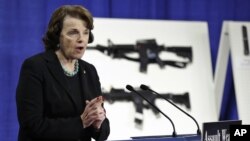CAPITOL HILL —
U.S. lawmakers have unveiled a bill that would ban military-style assault weapons - a major component of the Obama administration’s gun control proposal crafted after last month’s mass slaughter of school children in Newtown, Connecticut. The ban is likely to face strong opposition from gun rights proponents inside and outside the Capitol.
Democratic Senator Dianne Feinstein said the bill has a clear purpose. She said, “We are introducing legislation to help end the mass shootings that have devastated countless families and terrorized communities.”
The bill would prohibit the manufacture, importation, and sale of more than 150 military-style firearms, as well as components that can turn less powerful guns into de-facto assault weapons. It also limits gun magazines to 10 rounds of ammunition.
Flanked by other Democratic lawmakers, municipal police chiefs, and victims of gun violence, Feinstein said assault weapons have no legitimate civilian use - and enable atrocities like Newtown.
“Weapons designed originally for the military to kill large numbers of people in close combat are replicated for civilian use," she said. "They fall into the hands, one way or another, or grievance-killers, of gangs, of those who are mentally-unstable or ill.”
Democratic Senator Charles Schumer put it more succinctly. He said, “Assault weapons were designed for and should be used on our battlefields, not our streets.”
The proposed legislation is a more comprehensive version of an assault weapons ban enacted in 1994 that expired a decade later. Although gun violence continued while the law was in effect, mass shootings became less common - and have escalated since its expiration.
Most Republican lawmakers, and even some Democratic proponents of gun ownership rights, are expected to oppose the bill. America’s main gun rights lobby, the National Rifle Association, is already gearing up for a major legislative battle. NRA chief Wayne LaPierre spoke earlier this week.
“We believe we deserve and have every right to the same level of freedom that our government leaders keep for themselves. And the same capabilities and the same technologies that criminals use to prey upon us and our families," he said. "That means we believe in our right to defend ourselves and our families with semi-automatic firearms technology.”
LaPierre’s argument does not convince Democratic Congresswoman Carolyn McCarthy, whose husband was shot and killed on a New York commuter train in 1993.
She asked, “How many people have to be killed before we do something?”
Until the Newtown shootings, gun control was rarely mentioned in the nation’s political discourse. Today, even the strongest proponents of gun control acknowledge the votes may not exist in Congress to pass an assault weapons ban.
Yet the political calculus surrounding gun control appears to have changed. Analysts say proposals to regulate and track the sale of firearms, strengthen background check requirements, and keep weapons out of the hands of the mentally ill could become law if Americans remain engaged and demand action from their representatives.
Democratic Senator Dianne Feinstein said the bill has a clear purpose. She said, “We are introducing legislation to help end the mass shootings that have devastated countless families and terrorized communities.”
The bill would prohibit the manufacture, importation, and sale of more than 150 military-style firearms, as well as components that can turn less powerful guns into de-facto assault weapons. It also limits gun magazines to 10 rounds of ammunition.
Flanked by other Democratic lawmakers, municipal police chiefs, and victims of gun violence, Feinstein said assault weapons have no legitimate civilian use - and enable atrocities like Newtown.
“Weapons designed originally for the military to kill large numbers of people in close combat are replicated for civilian use," she said. "They fall into the hands, one way or another, or grievance-killers, of gangs, of those who are mentally-unstable or ill.”
Democratic Senator Charles Schumer put it more succinctly. He said, “Assault weapons were designed for and should be used on our battlefields, not our streets.”
The proposed legislation is a more comprehensive version of an assault weapons ban enacted in 1994 that expired a decade later. Although gun violence continued while the law was in effect, mass shootings became less common - and have escalated since its expiration.
Most Republican lawmakers, and even some Democratic proponents of gun ownership rights, are expected to oppose the bill. America’s main gun rights lobby, the National Rifle Association, is already gearing up for a major legislative battle. NRA chief Wayne LaPierre spoke earlier this week.
“We believe we deserve and have every right to the same level of freedom that our government leaders keep for themselves. And the same capabilities and the same technologies that criminals use to prey upon us and our families," he said. "That means we believe in our right to defend ourselves and our families with semi-automatic firearms technology.”
LaPierre’s argument does not convince Democratic Congresswoman Carolyn McCarthy, whose husband was shot and killed on a New York commuter train in 1993.
She asked, “How many people have to be killed before we do something?”
Until the Newtown shootings, gun control was rarely mentioned in the nation’s political discourse. Today, even the strongest proponents of gun control acknowledge the votes may not exist in Congress to pass an assault weapons ban.
Yet the political calculus surrounding gun control appears to have changed. Analysts say proposals to regulate and track the sale of firearms, strengthen background check requirements, and keep weapons out of the hands of the mentally ill could become law if Americans remain engaged and demand action from their representatives.




